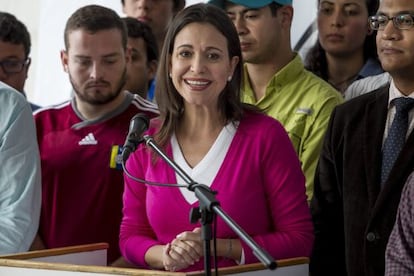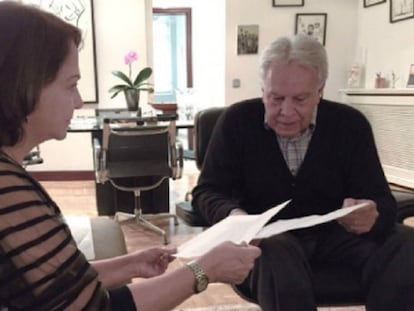Venezuelan opposition applauds ex-PM’s move to defend jailed leaders
Latin American figures believe Felipe González’s actions will shed light on country’s crisis

Venezuela’s opposition on Monday applauded the announcement by former Spanish Prime Minister Felipe González that he would help defend its jailed leaders, Leopoldo López and Caracas Mayor Antonio Ledezma, who continue to be held in a military prison outside Caracas despite pleas from the international community for their release.
López’s wife Lilian Tintori said it “was an honor to rely on an international figure of such scale” while Jesús Torrealba, head of the opposition’s MUD coordinating committee, said González’s involvement demonstrates that the “world is becoming aware that the situation in Venezuela is unsustainable.”
The former Spanish Socialist prime minister told EL PAÍS on Sunday that he has decided to take on the two cases because of the deteriorating human rights situation in Venezuela and the absence of guarantees afforded to the prisoners while they are being held.
The fact that a former Spanish prime minister will assume the defense of two political prisoners in Venezuela is a powerful symbol” Former Chilean president Sebastián Piñeda
Henrique Capriles Radonski, who lost to President Nicolás Maduro in 2013, congratulated González for his decision, adding that “he was good friends” with the former prime minister.
Capriles, who serves as governor of Miranda state, pointed out that González would not defend López or Ledezma in a courtroom but would instead “take their cases to different forums and serve as a spokesman for their cause.”
López, a former mayor of the Caracas district of Chacao who has been held at a military prison for the past year, is on trial for charges related to last year’s widespread anti-government violence that left at least 40 people dead. His lawyers said he is in solitary confinement.
Last month, Venezuelan secret police barged into Mayor Ledezma’s offices and took him after Maduro accused the opposition of trying to overthrow his government.
Tintori and Ledezma’s wife, Mitzy Capriles, have been conducting an international campaign to seek the release of their husbands.
Also on Monday, one of Ledezma’s daughters was briefly detained by anti-drug officers at Caracas’s Simón Bolívar International Airport. Her passport was returned and she was allowed to travel after being held for questioning for around an hour.
For her part, former lawmaker María Corina Machado, said González’s involvement in the cases shows “to what extent the perception of the crisis is changing in the international community.”
“Today we are aware that we can count on Spanish democrats. Leopoldo López, Antonio Ledezma, Daniel Ceballos [another mayor being held] and other political prisoners not only represent a part of society but the struggle of a people against a dictatorship that has criminal connections,” she said.
González’s announcement was also welcomed by many Latin American political figures, including former Brazilian President Fernando Henrique Cardoso.
“The time has come for democratic voices, especially the Latin American democratic governments to protest the abuses being carried out by the government of Venezuela,” he said.
Chile’s former President Sebastián Piñeda predicted that González would “shed some light for the world about the deep crisis that is confronting Venezuela.”
“At the same time, his participation will serve as an incentive to put an end to the indifference, the silence and the complicity by many governments who have observed this crisis,” Piñera said.
“The fact that a former Spanish prime minister and ex-Socialist leader will assume the defense of two political prisoners in Venezuela is a powerful symbol,” he said.
In 1977 González successfully intervened in the case of two political prisoners held by late dictator Augusto Pinochet
The former Chilean president traveled to Caracas along with former Colombian leader Andrés Pastrana in January to visit López in prison, but the Venezuelan police stopped them from going in.
Maduro criticized the trip by the two former leaders, who were able to meet with human rights victims and journalists before leaving Caracas.
“We could see with our own eyes what was happening so we were able to formulate a clear and strong opinion,” he said.
Outgoing Organization of American States (OAS) secretary-general José Miguel Insulza said González’s involvement would help López, Ledezma and other prisoners secure guarantees in their defense if not their release.
Another former Chilean president, Ricardo Lago, recalled when González intervened in the case of two political prisoners held by the late dictator Augusto Pinochet.
“In 1977, Felipe González came to Chile to intercede on behalf of two political prisoners, Erick Schnake and Carlos Lazo. It was a successful trip. Now, many years later, with a complicated and difficult situation in Venezuela, where a political solution is needed, Felipe González is once again opening the way. We wish him luck,” said Lagos.
The Maduro government did not immediately react to González’s actions. The Venezuelan Embassy in Madrid has called a news conference with several ruling party deputies.
Tu suscripción se está usando en otro dispositivo
¿Quieres añadir otro usuario a tu suscripción?
Si continúas leyendo en este dispositivo, no se podrá leer en el otro.
FlechaTu suscripción se está usando en otro dispositivo y solo puedes acceder a EL PAÍS desde un dispositivo a la vez.
Si quieres compartir tu cuenta, cambia tu suscripción a la modalidad Premium, así podrás añadir otro usuario. Cada uno accederá con su propia cuenta de email, lo que os permitirá personalizar vuestra experiencia en EL PAÍS.
En el caso de no saber quién está usando tu cuenta, te recomendamos cambiar tu contraseña aquí.
Si decides continuar compartiendo tu cuenta, este mensaje se mostrará en tu dispositivo y en el de la otra persona que está usando tu cuenta de forma indefinida, afectando a tu experiencia de lectura. Puedes consultar aquí los términos y condiciones de la suscripción digital.









































